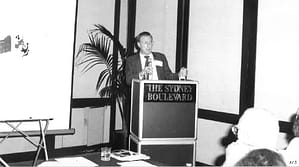In 1988 I asked, “how are we going, mate?”. It was part of a speech made at the Howard Ruff International Investment Seminar in Sydney. The audience was made up of a few Aussies and a bunch of Americans. This article covers success formulas and problems facing Australia (in the late 1980’s) and how the gold industry could help. Croesus Mining NL is also used as a case study to show what can happen with good attitudes.

Success formulas
Success is essentially an attitude of mind, coupled with determined action. They say ideas without action are but words in the wind. In the US and Australia we are fortunate to still have a few basic freedoms. This permits human endevour to take seed and flourish, and is in direct proportion to the degree of responsible freedom that we can achieve for ourselves.
You will notice some strange things in Australia. We have somehow permitted our various federal and state governments to step outside the legitimate roles of government. You will see government operating everything in Australia from airlines to banks, insurance companies to public transport.
Does this seem strange to you? It’s all very strange to me too. I can give you so many examples of governments failing in areas to which they should be confining themselves (ie. managing the economy and balancing the books, law and order). There is a very good case for confining the whole of the government’s time and energy into these specific legitimate areas of government activity.
 Henry Hazlitt, the noted economic commentator, described the correct role of government as:
Henry Hazlitt, the noted economic commentator, described the correct role of government as:
“If they simply forbid what is harmful to others, they have a big enough job for any government to take care of. Moreover, you have definite logical boundaries to that job. But if, from governments, you begin to demand altruism, legally, there are no logical limits until everybody has been forced to give away all he has earned….Then you are back to the point where no one has any incentive whatsoever, to earn or produce anything.”
Four ways to achieve political and economic freedom
There are encouraging signs that people are learning to fight back and protect their freedom in a more effective manner.
- Education is a pre-condition for any meaningful increase in freedom and this comes from a study of free market economics and its economic and social benefits.
- Economic self-protection and self-preservation. This is how individuals can protect themselves against inflation and other government policies.
- Non-violent, peaceful forms of civil disobedience (against government and bureaucrats, when they go beyond their legitimate function). This is one of my specialties as I’ve been involved in the past with companies who have put on extra staff, just to fill in various government forms and questionnaires. It’s probably good management to delegate such tasks, but you find that you build up your own bureaucracy, which in turn feeds on its self and spends most of its time sawing sawdust, as I say. Instead of that, I have all such enquiries directed to me personally and I deal with them in one of two ways. I either throw the form in the bin or respond to their pleading phone calls with some intense interrogation on why they need the information, and what they intend to do with it. I remind them that under our existing laws, they are not entitled to any more information than the investing public and on that basis they should gather their information from our published figures just the same as anyone else. After all that we usually find they take us off their mailing list and leave us alone. I notice also the increasing usage of educational tools such as rubber stamps. People are using them on envelopes, letterheads, bank cheque forms and on correspondence to politicians. As Ronald Reagan has said: “as government expands, liberty diminishes”.
- Political action and its use to roll back the power of the state and restore the rights to individuals. The French economist Frederic Bastiat once said “the state is that fictitious entity by which everyone seeks to live at the expense of everyone else”.
Limiting the power of government or the state is a prerequisite for the survival of Western Civilisation and I urge you to take every opportunity to vote for or support anyone who has a program for curbing the excesses of government.
Some problems
Don’t worry, these are solvable. As I mentioned, there are additional involvements of government in Australia when compared to the US. This gives us more excuses to be ourselves in a similarly serious situation of indebtedness. Our international debt is more than A$100b, growing at nearly A$1b per month. This new debt has largely financed consumption, rather than capital investment.
Australia’s position is complicated by its chronic debt. Our persistent public sector borrowing and uncompetitive work practices have flowed back into the current account, producing a deficit which may take 10 years to reduce. Problems are normal and represent challenges.
There is a myth about Australian workers being lazy. But let me assure you, the mining industry includes some of the hardest working people in the world and they work with a pride in being part of the wealth-creating sector of Australia. Mining management, along with Australian business people, have generally been described by Bob Ansett, a leading public figure in Australia as “very good! They have to be to survive in this country because they are facing odds that most countries and most business elsewhere do not have to face”.
Bob Ansett cites the inherent disincentive of a punitive tax system, predication toward equality, of “trying to hold people down to the lowest common denominator”, and “our school and industrial system not encouraging achievement, rather it discourages them and holds them back”.
If you can make it through our obstacle course, you will succeed anywhere in the world. That’s why out people are in constant demand from other countries.
Australia’s growing mining industry
Australia’s rapidly expanding mining industry is rising to this challenge and is pioneering many advances in increased efficiencies of exploration, mining and treatment methods. Our mining industry is the only industry expanding at a rate nearing that of the rate of growth of government, and is possibly the only industry with the ability to reverse Australia’s population drift from the country to the cities.
One prime formula for success is that the mining industry must become more intelligently vocal about keeping the various governments out of the way of the industry. We must fight for and maintain our FREEDOM TO PRODUCE. You can appreciate that as individuals, if you are paying a total of 50% of your income in combined tax, then you’ve lost 50% of your freedom to produce.
It’s very easy for industry to lose track of the total tax they pay because of the number of taxes — local, state and federal. There’s capital gains tax, payroll tax, sales tax, stamp duty and various rates, plus the costs involved in the constant form filling. In Australia, our state governments fine employers for providing employment. They call it payroll tax, and the more people you employ, the more tax you pay. Wouldn’t you think that for generating jobs, employers should be given prizes, not penalties?
Industrial companies in Australia can pay as much as 84% tax and have therefore effectively lost 84% of their freedom to produce. The gold mining industry has maintained a high profile in its efforts to minimise the number of taxes it pays and as a result has not permitted itself to be crippled tot eh same extent as other Australian industries.
The gold mining industry will need to continue this winning formula to maintain its position. In that way, we will continue to protect an expanding gold mining industry, creating productive jobs, earning revenue and supporting a healthy service industry — all contributing to the real welfare of Australia.
The Croesus story
This brand new, small company gather together a small group of people and raised a little over $2m. Nine months later it became a gold producer at the rate of 25,000oz per year, turning in an estimated profit of A$4.8m for the half year to December 31. (You can read more about this here).

For those interested in history, the original Croesus — the King of Lydia — was the first king to mint gold coins and discovered that by minting the bullion, it permitted holders to avoid assay and weighing before resale. He therefore pioneered the 3000-year history of gold as money and enabled people to trade gold at any time in any country, for goods or other monies.
Our prospectus, which was circulated to the public mid-1986, stated that our objective was to explore several promising prospects being explored by Mannkal Mining Pty Ltd, my private family company. Our family company has been exploring in the Kalgoorlie region of Western Australia since 1966 and has had a reasonable track record of completing the initial exploration and then joint venturing to larger companies.
Mannkal was not able to carry the burden of exploration beyond initial proving work because it was only a small private operator. Generally this resulted in Mannkal either selling the prospect or diluting to a very low equity position. Quite often when Mannkal sold prospects into large companies I was then invited onto the board as Exploration Director or some similar title. It seemed a logical development that I form a larger public company to give continuity right through, from exploration to mining and production.
At the time of our public listing, life was not easy on the Australian financial markets. The Australian dollar was being devalued by 17% in the week or two after we issued our prospectus. This meant our overseas investors were phoning me to say they had already lost 17%, even before our shares were listed. Not a good start but we managed, with some effort, to fill the issue and raise the $2m. The market improved over the next few months and our exploration activities developed to the point where our shares were trading at a healthy premium.
However, exploration and development takes time and I felt, as did my co-directors, that we had to progress the company much quicker. We started looking at the various propositions where we could buy equity in producing situations.
One such situation did come about, right in our own backyard. Literally, in that we were already exploring the adjacent ground. This opportunity was to buy a 100% interest in a gold producing mine just being brought into production, together with a string of other advanced exploration prospects around the Kalgoorlie area.
However, the cost of this package was A$20.3m and with 30 days to pay. The deposit along, payable immediately, was twice as much as we had in the bank. It requires some very fast footwork and excellent support from institutions and brokers. We are now virtually debt-free, having repaid this full amount of A$20.3m from cash-raising and profits from the mine.
The overall picture
If we take the Croesus story and multiply it by the hundreds of other such companies that have come into existence during this very frantic exploration and stock market explosion, we will see the significance in the overall picture.
 In the first nine months of 1987, a grand total of A$4.1b was raised by the resource sector on the Australian equities markets. That cash reserve of A$4.1b, for continued exploration and even takeover and acquisition, is substantial. Especially when you appreciate that it represents three times the amount currently being spent on our new Parliament House in Canberra.
In the first nine months of 1987, a grand total of A$4.1b was raised by the resource sector on the Australian equities markets. That cash reserve of A$4.1b, for continued exploration and even takeover and acquisition, is substantial. Especially when you appreciate that it represents three times the amount currently being spent on our new Parliament House in Canberra.
Australia has one of the best track records of exploration dollars expenditure in the ground required to find mines. If this huge amount of capital raised can be encouraged to continue exploring, we will see some spectacular results.
Even in our own area of the West Australian Goldfields there were 25 new mines brought into production during the past 12 months. In Western Australia there’s an interesting statistic that mirrors the success of gold mining. It’s the growth of the industry organization of which I am a councillor — The Association of Mining and Exploration Companies (more commonly referred to as AMEC).
Six years ago AMEC had thirty members, with only one a producer (a tin producer). Membership is now 132 plus another 124 associate members who provide their goods and services to the industry. Of our 132 members, 50 are now producers and these include some very significant names such as Western Mining Corporation, Metana, ACM, Whim Creek and Sons of Gwalia.
The future of gold mining in Australia
 I am totally confident in our politician’s ability to continue their policy of currency destruction to the stage that guarantees a high A$ price for gold.
I am totally confident in our politician’s ability to continue their policy of currency destruction to the stage that guarantees a high A$ price for gold.
Ian Huntley, in his Australian investment newsletter called Your Money Weekly, gives these words of encouragement with respect to the international physical gold price.
“Both in the 1873/8 and 1929/32 depressions, gold production rose strongly either at a fixed gold price or in a period of rising gold prices. In both cases a long period of very profitable gold mining was to follow. In the 1930’s, for instance, gold production doubled internationally”. Matching these encouraging economic indicators is another equally encouraging political development.
The socialists have been winning for 70 years. Not because their program is tactical (it is not), but because their vision has attracted the young. It is said that “without a vision the people perish” and the socialists certainly gave the young people a vision. However, history is now writing the sorry story of how that vision has failed. A recent poll of student attitudes in Australia showed that 74% support ideas of libertarian free enterprise and 65% blamed governments or unions for our economic problems.
From this new generation the mining industry needs to recruit the ‘black belt libertarian’ as I call them — people skilled in understanding and explaining how well the world has worked during brief periods of free enterprise. It can work again if we only remove the socialist shackles of both our major political parties.
Meanwhile, I’m very proud to be part of this exciting industry and the many opportunities to keep on applying these successful survival formulas.
